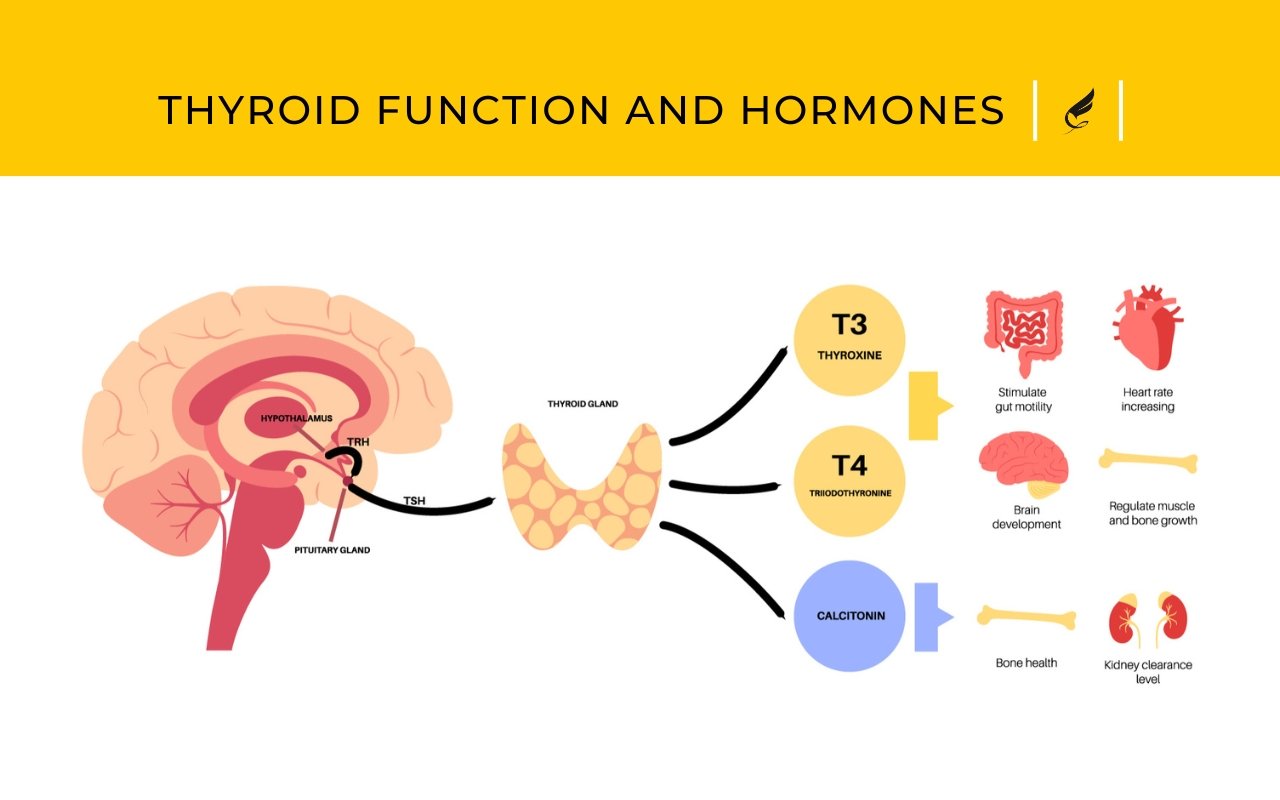Hashimoto's Disease and Dietary Changes: A Comprehensive Guide
Understanding Hashimoto's and Its Impact on Thyroid Function
Hashimoto's disease, also known as Hashimoto's thyroiditis or autoimmune hypothyroidism, is a chronic autoimmune disorder that affects the thyroid gland. The thyroid gland, located in the front of your neck, produces hormones that regulate metabolism, energy levels, and various other bodily functions. In Hashimoto's disease, the immune system mistakenly attacks the thyroid gland, leading to inflammation and gradual destruction of thyroid tissue. This attack results in hypothyroidism, or an underactive thyroid, characterized by decreased production of thyroid hormones.
Prevalence and Individual Impact
Hashimoto's disease is one of the most prevalent thyroid disorders, affecting approximately 14 million people in the United States. It can occur at any age but is most commonly diagnosed in women between the ages of 30 and 50. The disease can significantly impact daily life, causing a wide range of symptoms that can vary from person to person.
Common Symptoms of Hashimoto's Disease
The symptoms of Hashimoto's disease often develop gradually and can be subtle at first. Common symptoms include:
Fatigue and sluggishness
Unexplained weight gain
Depression and mood swings
Constipation
Dry skin and hair loss
Increased sensitivity to cold
Cognitive difficulties, such as brain fog and memory problems
What Causes Hashimoto's Disease?
The exact cause of Hashimoto's disease remains unknown, but several factors are believed to contribute to its development:
Genetics: A family history of autoimmune diseases, including Hashimoto's disease, increases the risk of developing the condition.
Environmental Factors: Iodine deficiency, certain viral infections, and stress may play a role in triggering Hashimoto's disease in susceptible individuals.
Other Autoimmune Diseases: Individuals with other autoimmune diseases, such as rheumatoid arthritis, celiac disease, or type 1 diabetes, have a higher risk of developing Hashimoto's disease.
Diagnosis and Treatment
Diagnosis of Hashimoto's disease typically involves a blood test to measure thyroid hormone levels, specifically thyroid-stimulating hormone (TSH) and free thyroxine (FT4). Elevated TSH levels and low FT4 levels indicate hypothyroidism. Additionally, a test for thyroid antibodies, such as thyroid peroxidase antibodies (TPOAb), may be conducted to confirm the autoimmune nature of the condition.
Treatment for Hashimoto's disease often involves hormone replacement therapy to restore adequate thyroid hormone levels. However, dietary and lifestyle changes can also play a significant role in managing symptoms and improving overall well-being.
Managing Hashimoto's Disease Symptoms Through Diet
Dietary modifications can be a valuable tool for managing Hashimoto's disease symptoms. Here are some key recommendations:
Prioritize a Nutrient-Dense Diet: Focus on whole, unprocessed foods, including fruits, vegetables, lean proteins, and healthy fats. These foods provide essential nutrients that support thyroid health and overall well-being.
Manage Iodine Intake: Iodine is crucial for thyroid hormone production, but both excessive and insufficient intake can be problematic. Consult your doctor to determine the appropriate iodine intake for your needs.
Consider a Gluten-Free Diet: Some individuals with Hashimoto's disease find that eliminating gluten from their diet helps alleviate symptoms. Gluten is a protein found in wheat, barley, and rye.
Manage Selenium Levels: Selenium is a trace mineral that plays a role in thyroid hormone production. Adequate selenium levels are essential, but excessive supplementation can be harmful. Consult your doctor to determine the appropriate selenium intake for your needs.
Focus on Gut Health: The gut microbiome plays a role in immune function and overall health. Supporting gut health through probiotic-rich foods and supplements may help manage Hashimoto's disease symptoms.
Limit Processed Foods: Processed foods often contain high amounts of unhealthy fats, added sugars, and artificial ingredients that can contribute to inflammation and exacerbate Hashimoto's disease symptoms.
Consider an Anti-Inflammatory Diet: An anti-inflammatory diet, rich in fruits, vegetables, and omega-3 fatty acids, may help reduce inflammation and support thyroid health.
Supplements for Hashimoto's Disease
In addition to dietary changes, certain supplements may be beneficial for individuals with Hashimoto's disease. However, it's critical to consult your doctor before taking any dietary supplements, as they can interact with medications or have unintended side effects. Some supplements that may be considered include:
Selenium: Selenium supports thyroid hormone production and may help reduce thyroid antibodies.
Vitamin D: Vitamin D deficiency is common in individuals with Hashimoto's disease and may contribute to symptoms. Supplementation can help restore adequate levels.
Probiotics: Probiotics can support gut health and may help modulate the immune response, potentially reducing inflammation in the thyroid gland.
Sample High-Protein Meal Plan for Hashimoto's Disease
This sample meal plan provides a starting point for individuals with Hashimoto's disease looking to incorporate a high-protein diet. Remember to consult your doctor or a registered dietitian to personalize the plan based on your individual needs and preferences.
Day 1
Breakfast: Scrambled eggs with spinach and avocado
Lunch: Grilled chicken salad with mixed greens and olive oil dressing
Dinner: Baked salmon with roasted vegetables
Day 2
Breakfast: Greek yogurt with berries and nuts
Lunch: Turkey breast wrap with whole-wheat tortilla and vegetables
Dinner: Lentil soup with a side of whole-grain bread
Day 3
Breakfast: Oatmeal with protein powder and fruit
Lunch: Tuna salad with mixed greens and a side of fruit
Dinner: Chicken stir-fry with brown rice
Day 4
Breakfast: Smoothie with protein powder, spinach, and berries
Lunch: Leftover chicken stir-fry
Dinner: Ground turkey meatballs with zucchini noodles
Day 5
Breakfast: Eggs with whole-wheat toast and avocado
Lunch: Salad with grilled chicken or chickpeas
Dinner: Salmon with roasted vegetables
Day 6
Breakfast: Yogurt with fruit and granola
Lunch: Leftover ground turkey meatballs with zucchini noodles
Dinner: Chicken and vegetable skewers with quinoa
Day 7
Breakfast: Smoothie with protein powder, fruit, and spinach
Lunch: Tuna salad with whole-wheat crackers
Dinner: Lentil soup with a side of whole-grain bread
This meal plan is a sample and can be adjusted to fit your individual needs and preferences. Be sure to include various nutrient-dense foods and consult with a healthcare professional for personalized guidance.
Conclusion
Hashimoto's disease is a common autoimmune disorder that can significantly impact your health and well-being. While medication is often necessary to manage thyroid hormone levels, dietary and lifestyle changes can play a crucial role in alleviating symptoms and improving your overall quality of life. By prioritizing a nutrient-dense, anti-inflammatory diet, managing iodine and selenium intake, considering a gluten-free diet, supporting gut health, and incorporating appropriate supplements, you can take proactive steps to manage Hashimoto's disease and live a healthier, more fulfilling life.
Remember, it's always best to consult your doctor or a registered dietitian before making significant dietary changes or starting any new supplements, especially if you have underlying health conditions.







